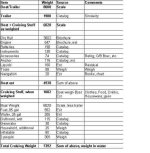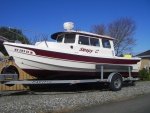That light boat weight by the factory sounds like it is w/o engine(s), no gas, water, batteries, anchors, etc, kinda like Boris on Journey On put it.
I'm probably the oddball in the group. My 2003 C-Dory Cruiser appears to be lighter than most, it is s/n 007 (3rd of the newer style since 1996). I weighed it on a Salvation Army scale, unhitched and tongue included on the scale. It weighed 7,425 lbs, and that was in late 2006 after 3 years of use, so all the basic equipment on board. This model year has the thin (1/4") roof, no extra fiberglass cover panel for the batteries, and without several other weight additions that came in later years -- though those additions look very nice.
I have towed it since 2004 with a 2003 Ford Expedition, 5.4L, 3.73 ratio differentials, 4-wheel drive, tow package, rated for 8,700 lbs tow capacity (including passengers and any gear in the tow vehicle). 8,900 lbs tow capacity for the 2-wheel drive model. The Expedition is a 1/2 ton vehicle, but in 2003 it was redesigned extensively for a higher tow rating, rear independent suspension, etc. In these past 14 yrs I estimate I've put at least 20k+ miles towing, including every year over the Grapevine (between SoCal and Bakersfield, CA), about 6,000 ft climb. I don't "muscle" the Expedition, rather I watch the speed and RPMs religiously, dropping manually into 2nd gear on ANY incline, just to keep it easy on the trans and power train. Most hills are taken at 45-50 mph, although some of the very, very steep ones I drop into 1st gear and hold 35 mph at 3500 rpm until over the hill. Down steep hills, I watch my speed as well. I have gone 65+ mph and tested the stability, no issues, it is a great setup, the best I've every had with any boat. Not towing I see 17-20 mpg, depending on wind, terrain, # of people/gear, mostly camping trips. Like Colby said, it's a trade-off. I use my Expe enough throughout the year that the gas mileage is somewhat significant and worth the babying I do for towing (to me).
I have an equalizing hitch and surge brakes (4 wheels), the combo works fine. The trailer was built with a sliding hitch just to accommodate. The trade-off though is you have to keep the hitch weight fairly light, because if you crank up the equalizer too tight, it will bind against the surge brakes action.
7,425 lbs with the following conditions:
- Galvanized steel trailer (27 ft model), dual axle, 102" wide -- its estimated weight by Pacific Trailer is 2000-2200 lbs, leaf springs, wooden bunks and side bunk guides
- Twin Yamaha 80 4-strokes
- 1/2 tank gas (50 gal)
- 1/2 tank water (8 gal)
- 2 batteries, small amount of extra oil/maintenance supplies, tool box
- 2 anchors/rode, windlass
- Small bait tank (17 gal), plastic, empty
- Bimini for cockpit (no side windows), aluminum tubing
- 24" radar, stereo, VHF, GPS chartplotter, fishfinder
- Plus food, ice chest, kitchen supplies (always on board), clothes, sleeping bags for a weekend trip for 4
I watch carefully what I put on the boat, and unless it is REALLY needed, I don't leave it on the boat. I have had 14 previous boats (sail and power) and have watched some of them get overloaded by being lazy, just won't let it happen with this one. Now I'm curious, I'll have weigh it again, I have load range E tires now, and who knows, maybe weight creep has hit me too...
Average gas mileage over all these years is steady at 2.75 nmiles per gal. With twins and Permatrims, I'm happy. But it also supports that my boat is light. The CD-25's ride best as light as possible, the 22's don't seem to be as sensitive to weight for a good ride with their steeper bow entry angle.


